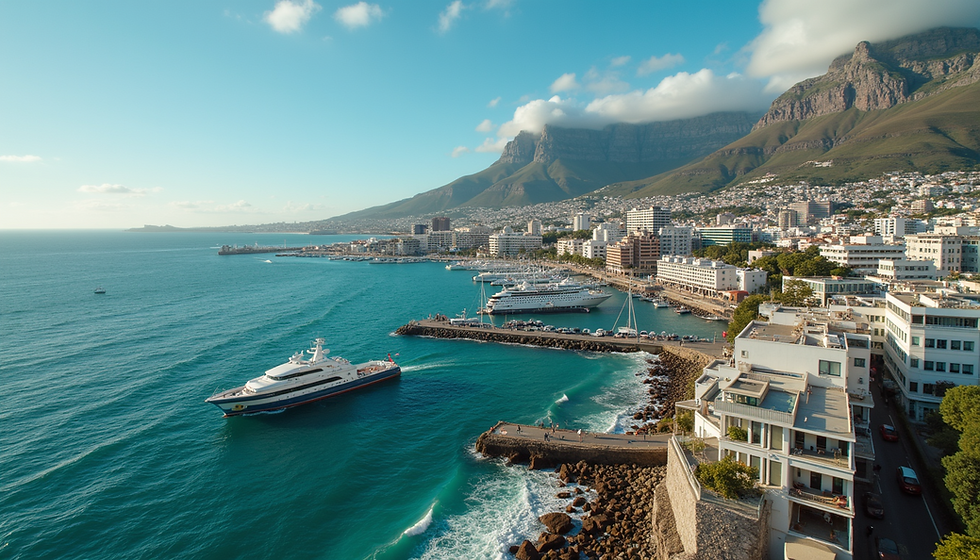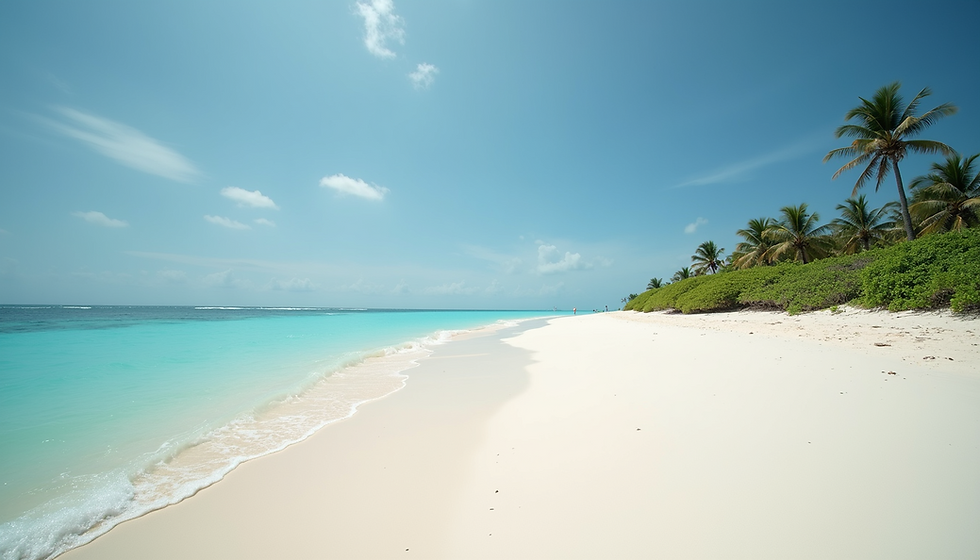Essential Swahili Words Every Traveler Should Know Before Visiting Zanzibar
- zanzibudget
- Jun 25, 2025
- 6 min read
Updated: Jul 20, 2025
Zanzibar, a picturesque archipelago off the coast of Tanzania, is famous for its stunning beaches and rich cultural heritage. Traveling here offers an incredible opportunity to explore beautiful landscapes and sample delicious traditional food. But to truly connect with the locals, knowing a few basic phrases in Swahili can make all the difference. Research shows that travelers who engage with locals are 60% more likely to have a memorable experience.
Swahili, known locally as Kiswahili, is Tanzania's national language and widely spoken in Zanzibar. This guide provides essential Swahili words and phrases that will help you navigate, dine, shop, and connect with the friendly Zanzibaris you meet.
Greetings and Common Courtesy
Establishing rapport with locals starts with simple greetings. These basic phrases can open doors to conversations and friendships.
"Jambo" - Hello
"Jambo" is the first word you should master. It means "hello" and can be used in almost any situation. Whether you're meeting someone for the first time or entering a shop, this friendly greeting lays a good foundation.
"Asante" - Thank You
Expressing gratitude is crucial. Saying "asante" demonstrates appreciation for assistance, whether it's a hotel staff member showing you to your room or a vendor handing you your purchase. Remember, a simple thank you can make a vendor's day.
"Karibu" - Welcome
When you enter someone's home or a local café, you might hear "karibu," meaning welcome. It's polite to respond with "asante" or reciprocate with "karibu," showing acknowledgment.
"Habari" - How Are You?
Use "habari" to ask someone how they are. A typical response is "nzuri," which means "good." This exchange can spark a more extended conversation about the local culture or recommendations.
Navigational Terms
Exploring Zanzibar's charm can be more enjoyable with some navigational phrases in your toolkit.
"Wapi?" - Where?
If you're looking for a specific location, "wapi?" will be invaluable. Pair it with your destination name, like "wapi hotel?" (where is the hotel?) to receive clearer directions.
"Sijui" - I Don’t Know
If someone asks you a question you cannot answer, saying "sijui" signals unknowingness politely.
"Nenda" - Go
"Nenda" is useful when asking for directions. For instance, saying "nenda wapi?" means “where should I go?” This phrase could also help when requesting a ride, such as a taxi.
"Mji" - Town
The word "mji" means town. Knowing this is helpful when asking for directions, like "mji wa Stone Town" (the town of Stone Town), which is known for its unique markets and historic architecture.
Dining Out
Zanzibar is famous for its vibrant culinary scene, which often leaves visitors craving more. Here are some helpful phrases related to dining.
"Chakula" - Food
Whether you're browsing menus or inquiring about meal options, "chakula" will come in handy. Many local dishes, like the beloved Zanzibar pizza, will tantalize your taste buds.
"Nataka chakula" - I Want Food
Use this phrase to indicate your craving for local cuisine. For instance, when at the market, telling a vendor "Nataka chakula" could lead to delicious discoveries.
"Maji" - Water
It's vital to know how to ask for "maji," especially in dining settings where staying hydrated is essential.
"Sawa" - Okay
Use "sawa" to indicate approval of a dish or for confirmations in conversation. For example, if a server asks if you enjoyed a meal, responding "sawa" shows you are satisfied.
Shopping and Bargaining
Zanzibar's markets are filled with colorful crafts and textiles. Here are key phrases to enhance your shopping experience.
"Kupatana" - To bargain
Bargaining is common in Zanzibar's markets. Knowing the word "patana" will empower you during negotiations for goods, from handcrafted jewelry to kanga fabric.
"Pesa" - Money
"Pesa" is crucial for any financial transactions. You'll hear it often when discussing prices, ensuring you understand costs before purchasing.
"Ningependa" - I Would Like
When expressing what you want to buy, say "ningependa" followed by the item, like "ningependa kanga" (I would like a kanga). This can help ensure clear communication with vendors.
"Bei" - Price
If you want to know the cost of an item, ask "bei gani?" (what is the price?). This simple phrase can save you from overspending or help manage your budget.
Local Sightseeing
Zanzibar is filled with historic sites and stunning vistas. These key phrases can enhance your sightseeing adventures.
"Nyumba" - House
While exploring landmarks like the House of Wonders, knowing "nyumba" can enrich your discussions about local architecture and history.
"Bahari" - Ocean/Sea
With its breathtaking beaches, "Bahari" becomes a vital term. Discussing activities like swimming or snorkeling will be much smoother with it.
"Tovuti" - Website
If you're looking up places online, knowing "tovuti" can streamline inquiries about businesses or attractions.
"Msitu" - Forest
When visiting natural spots like Jozani Forest, home to the rare red colobus monkeys, the term "msitu" can enhance your conversations about the lush surroundings.
Emergency Phrases
Though we hope for a smooth trip, having essential emergency phrases can be crucial.
"Sahihi" - Correct
If there's a misunderstanding or clarification is needed, "sahihi" helps indicate a problem that needs resolving.
"Wasiliana" - Contact
If you need to reach someone, knowing "wasiliana" is helpful. This phrase can make locating contacts easier.
"Nisaidie" - Help Me
In any situation where assistance is needed, saying "nisaidie" clearly expresses your request for help. This can be vital in emergencies.
"Sawa" - Okay
Once again, "sawa" can confirm understanding in conversations, even in stressful moments.
Final Thoughts
Zanzibar is a treasure of natural beauty, rich history, and friendly faces. By learning these essential Swahili phrases, you can enhance your travel experience and show respect for the local culture.
While English is spoken in many tourist areas, taking the time to learn even a few words of Swahili can lead to more meaningful interactions. You will find that engaging even a little can transform your adventure significantly.
Before you set off to explore this stunning destination, make sure to memorize these essential words. Your journey through Zanzibar will become even more rewarding for it.



ARE YOU RESIDENT?
ARE YOU LOOKING FORWARDS TO LIVE IN ZANZIBAR?
-find a Swahili teacher here! and speak Swahili in 3months like a native speaker.
KNOW MORE ABOUT THIS LANGUAGE
Swahili, also known as Kiswahili, as it is referred to in the Swahili language, is a Bantu language originally spoken by the Swahili people, who are found primarily in Tanzania, Kenya, and Mozambique (along the East African coast and adjacent littoral islands). Estimates of the number of Swahili speakers, including both native and second-language speakers, vary widely. They generally range from 150 million to 200 million;[7] with most of its native speakers residing in Tanzania and Kenya.
Swahili has a significant number of loanwords from other languages, mainly Arabic, as well as from Portuguese, English and German. Around 40% of Swahili vocabulary consists of Arabic loanwords,[8][9] including the name of the language (سَوَاحِلي Swahili, a plural adjectival form of an Arabic word meaning 'of the coasts'). The loanwords date from the era of contact between Arab traders and the Bantu inhabitants of the east coast of Africa, which was also the time period when Swahili emerged as a lingua franca in the region.
Due to concerted efforts by the governments of Kenya and Tanzania, Swahili is one of three official languages (the others being English and French) of the East African Community (EAC) countries, namely Burundi, Democratic Republic of Congo, Kenya, Rwanda, Somalia, South Sudan, Tanzania, and Uganda. It is the lingua franca of other areas in the African Great Lakes region and East and Southern Africa. Swahili is also one of the working (BUSINESS) languages of the African Union and of the Southern African Development Community. The East African Community created an institution called the East African Kiswahili Commission (EAKC) which began operations in 2015. The institution currently serves as the leading body for promoting the language in the East African region, as well as for coordinating its development and usage for regional integration and sustainable development.[14] In recent years South Africa, Botswana, Namibia, Ethiopia, and South Sudan have begun offering Swahili as a subject in schools or have developed plans to do so.
Shikomor (or Comorian), an official language in Comoros and also spoken in Mayotte (Shimaore), is closely related to Swahili and is sometimes considered a dialect of Swahili, although other authorities consider it a distinct language. based on Swahili's growth as a prominent international language, the United Nations declared Swahili Language Day as 7 July to commemorate the date that Julius Nyerere adopted Swahili as a unifying language for African independence struggles.
Extra: Swahili is an easy language due to:
-Easy to read the examples provided, such as "BaraBara" and "Sawasawa," illustrate this point well. it is not complicated language at all; you just pronounce what is written.
-Easy to write The Explanation that Swahili is easy to write because it is phonetic is clear and helpful. Consider adding a few more examples to reinforce this point.
-Easy to pronounce the repetition of words like "BaraBara" and "Sawasawa" helps to emphasize this.
Additionally, Swahili has many short words like "sawa" (okay), and the longest one is "kipi kikusikitishacho" (what bothers you). This simplicity makes it an accessible and enjoyable language to learn.
DO YOU WANT TO COME TO ZANZIBAR?
Contant us for more Tips. and we will be happy to help you for many things




Comments